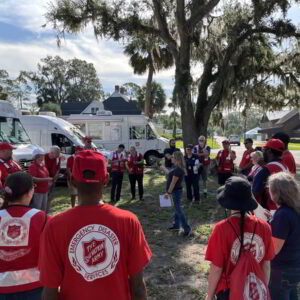ALEXANDRIA, VA — The Salvation Army’s Emergency Disaster Services (EDS) teams launched multistate feeding and relief operations after Tropical Storm Debby made landfall in Florida as a Category I hurricane on the morning of Aug. 5. While the system was downgraded to a tropical storm later in the day, forecasts predict that Debby will bring historic rainfall levels to the Southeastern coast, continuing the trend of a truly record-breaking 2024 Atlantic hurricane season. In response to the immediate and ongoing impacts of the disaster, The Salvation Army’s trained disaster personnel have activated mobile feeding units and evacuation shelters in Florida, Georgia, and the Carolinas as communities experience mass power outages and flooding.

“Recovery from every disaster is different, but The Salvation Army is prepared for a marathon, not a sprint,” said Commissioner Kenneth G. Hodder, national commander of The Salvation Army. “The Salvation Army was there before Tropical Storm Debby, and thanks to the overwhelming generosity of the American public, we will be able to continue meeting the needs of survivors and first responders for as long as the need persists.”
Additionally, The Salvation Army is working with federal, state, and local emergency management agencies to adapt response efforts as needed by monitoring the ongoing impacts of the storm.
“Though the South continues to bear the brunt of this Atlantic hurricane season, our EDS professionals and volunteers were ready to activate as soon as Tropical Storm Debby made landfall,” said Jeff Jellets, EDS director for The Salvation Army’s Southern Territory. “We are providing physical, emotional, and spiritual care to the affected communities to bring hope amid great loss.”
The Salvation Army’s active services:
- The Salvation Army of Florida activated seven mobile feeding units in Sarasota and Perry. The Salvation Army of Georgia has four mobile feeding units in Chatham, Coffee, Camden, and Glynn counties.
- 19 additional response and feeding units in the Carolinas have been placed on standby as the storm progresses, seven in South Carolina and 12 in North Carolina.
- Incident Management Teams are stationed throughout both Florida and Georgia to manage logistics and response on the ground in impacted areas.
- The Salvation Army Emergency Disaster teams are prepared to deliver critical emergency relief supplies, such as water and cleanup kits.
The best way to support EDS efforts in the Southeast is by making a financial contribution, which allows The Salvation Army to meet immediate and long-term needs. Those who are able to donate can do so through a variety of convenient methods:
- Online: helpsalvationarmy.org
- Phone: Call 1-800-SAL-ARMY or text “STORM” to +1 325-603-3395
- Venmo: @SalvationArmyUSA and use the keywords Tropical Storm Debby, Tropical Storm, or Debby
To learn more about The Salvation Army’s disaster relief efforts, click here.
A media kit with photos and other useful materials can be found here.
For media inquiries, please email mediarelations@salvationarmyusa.org.
About The Salvation Army
The Salvation Army annually helps more than 27 million people in America overcome poverty, addiction, and economic hardships through a range of social services by providing food for the hungry, emergency relief for disaster survivors, shelter for the homeless, and rehabilitation services for people in need. The Salvation Army is doing the most good at 6,400 centers of operation around the country. During times of disaster, 100% of designated donations to The Salvation Army are used for immediate response and long-term efforts. In 2021, The Salvation Army was ranked No. 2 on the list of “America’s Favorite Charities” by The Chronicle of Philanthropy. For more information, visit SalvationArmyUSA.org. Follow us on X @SalvationArmyUS and #DoingTheMostGood.
Media Contact: Bishop Wash, Director, PR, Lerma Agency, 972-854-1586
Read more news on Faith Based / Non Profit Organizations, Humanitarian Services and Disaster Relief on Missions Box.




